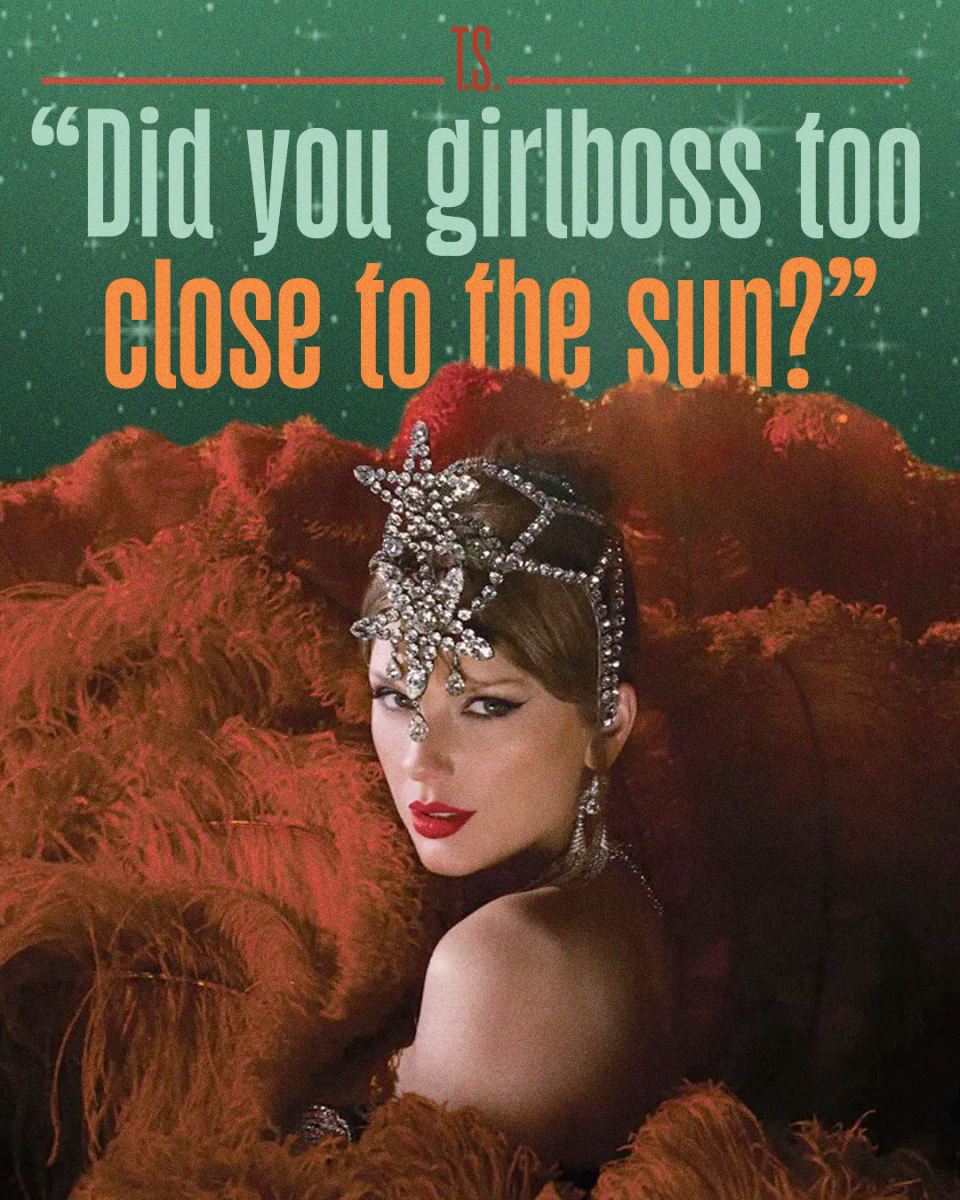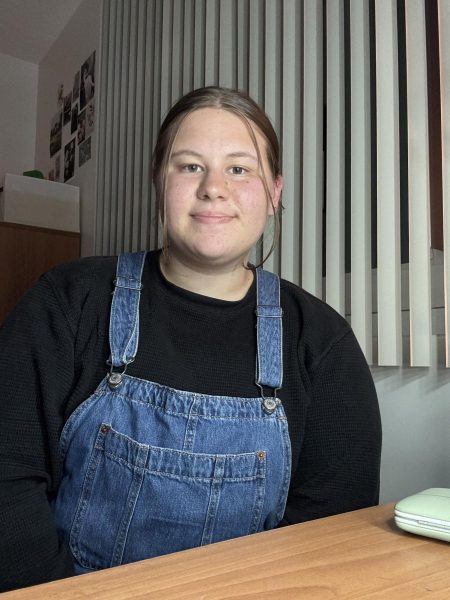‘The Life of a Showgirl’ is Swift’s Unlistenable Era
Morgan James
Anticipation for Taylor Swift’s “The Life of a Showgirl” was nothing short of astronomical. It shattered Adele’s decade-long first-week record rollout with 3.5 million units, and even beat out Michael Jackson’s four out of five star Rolling Stone rating for “Thriller.” Yet, after all the razzle-dazzle, Swift’s 12th studio album feels less like an expected masterpiece and more like a massive, cynical throwaway.
The album’s rollout was a masterclass in music marketing. With no lead single released, teases began with early, exclusive vinyl sales that held “Swifties,” the chosen name for Swift’s fanbase, and haters alike in a chokehold. Appearing on Jason and Travis Kelce’s podcast, “New Heights,” Swift stated, “Effervescence has come through on this record. So as you said, bangers.” She claimed that “The Life of a Showgirl” is born from the “vibrant” drama of her infamous run of “The Eras Tour.”
24 unheard vinyl variants later, fans find themselves at a crossroads. Expecting “1989”–level production with “folklore”–style storytelling, that promised effervescence does rear its head — in her marketing. The “bangers,” on the other hand, are absent.
A half-hearted, soulless product, “The Life of a Showgirl” severs any wisps of Swift’s usual god-tier lyricism, lingering rhythms and relatability from her musical notoriety.
Strip the vocals and some may tolerate the album as background noise. Even the combined might of music moguls Max Martin and Shellback couldn’t save the production; several songs open with a dull familiarity, hitting less like a hook and more like Dramamine.
The opening track, “The Fate of Ophelia,” leans noticeably close to “Text Book” by Lana Del Rey, with familiar melodic pacing and cadences. Some fans even note a similarity to “Give Your Heart a Break” by Demi Lovato.
A similar pattern follows with the third track, “Opalite,” drawing off a daunting mix of songs from Post Malone, Luis Miguel, Marshmello and The Ronettes. Perhaps most iconic is the intro to “Wood,” which sounds just like “I Want You Back” by The Jackson 5.
Swift has only 14 recorded samples in her 252-song catalog, yet this album is riddled with what seems like interpolations, or small recreations of other artists’ melodies and lyrics, that amount to a soul-sucking demolition of the original. This is a strange outcome for an artist who demands writing credit from artists who use her as inspiration, all the while proclaiming her own “terminal uniqueness” in track five.
If production is the crime, her lyrics are the knife. Each song has its own nugget of cringe and juvenile tackiness.
“Actually Romantic” opens with a doozy of a verse, “I heard you call me ‘Boring Barbie’ when the coke’s got you brave / Wrote me a song saying it makes me sick to see your face.” Swift frames this as an alleged clapback at Charli xcx’s song, “Sympathy is a knife,” which explores the music industry’s tendency to pit female artists against each other. Entirely missing the point, Swift responds with, “I mind my business, God’s my witness that I don’t provoke it / It’s kind of making me wet (oh),” indeed provoking it and making it awkward in standard Swift practice.
In “CANCELLED!” Swift pulls her cringe lyricism back out of her “reputation” toolbox, ready to beat the dead horse of victimhood. In response to backlash regarding her new Make America Great Again friends, we see lyrics like “I salute you if you’re too much to handle,” “We’re the ones with matching scars,” “Did you girlboss too close to the sun?” and of course, “Good thing I like my friends cancelled.”
Cloaking herself in a flimsy feminist guise, she uses “Did you make a joke only a man could?” to turn the blame off her controversies and toward guilting any critics of her brand as a victimized white woman.
Even the writing on the namesake track is aggressively bad. The opening lines of “The Life of a Showgirl” offer up the mind-numbing couplet: “Her name was Kitty / Made her money being pretty and witty / They gave her the keys to this city / Then they said she didn’t do it legitly.” That’s the rhyme scheme she chose.
Or take “Forgive me, it sounds cocky / He ah-matized me and opened my eyes” from “Wood,” which uses cursory slang to attempt reconciliation with the younger generations she’s no longer relatable to.
The writing is uncoordinated, petty, sexual and mediocre at its peak. Bad writing and copied production do not deserve five-star ratings.
Swift initially claimed “The Life of a Showgirl” mirrored her life, but as soon as ratings turned sour, she backtracked, claiming select lyrics were satirical. Satire or not, this album has confirmed her fear: Happiness and the lifestyle of violently mediocre billionaires plows through good writing.
In mirroring her new better-than-thou life, Swift has stripped herself of her key assets: relatability and authenticity. Now she can go off and appreciate Kelce’s “redwood” some more, preferably without another album release.
‘The Life of a Showgirl’ is allowed to just be fun and flirty
Anna Kate Mock
It seems whatever Taylor Swift produces, people will always have a reason to critique her art. When it’s too slow and melancholy, they want bangers. When it’s upbeat, people are longing for the poetry again. It’s as if she can never win.
“The Life of a Showgirl” confidently welcomes in a new phase of Swift’s life where she is happy and in love. And yet, she is being met with critics yearning for an old version of her.
Swift has been in the music industry for almost 20 years, having released 12 albums and four re-records. She has every right to experiment and try a new sound for herself — even if her fans don’t personally love it. She doesn’t owe anything to those who follow her for a specific style of music. Her music is her expression, and she can produce whatever she wants.
While “The Life of a Showgirl” is different from her more recent works, like “folklore” and “THE TORTURED POETS DEPARTMENT,” its upbeat sound radiates the joy she likely experienced while writing it. In terms of her entire discography, the album is not that far of a departure from her older works, such as “1989” and “reputation,” and in that regard, the critiques toward the style substantially lack foundation.
For this album, she partnered with the same producers and co-writers featured on “reputation” and “1989,” an inherent clue that the music would be more lighthearted.
The second track on the album, “Elizabeth Taylor,” is a catchy pop ballad that seeks to grapple with a life of infamy. This particular song is a reference to the late actress who, much like Swift, lived under extreme public scrutiny. Elizabeth Taylor, too, endured superficial scandals and had her private life negatively affect her career. She was often singularly known for her eight failed marriages instead of her work in cinema.
For years, Swift’s dating life has faced judgment, critiquing her for having too many exes or for making them the focus of her lyricism. This criticism, in turn, leaves very little room for her to explore her romantic life without negative commentary.
After four successive up-tempo songs, Swift slows the record down with “Eldest Daughter.” This song seems to be the piece that has come under the most fire. However, as she sings in the first verse, “Sad as it seems, apathy is hot / Everybody’s cutthroat in the comments.” In a way, she is directly speaking to her audience in a show of vulnerability, revealing her intense need for perfectionism — yet society is still finding a way to cut her down at every turn.
The part of the chorus that has garnered a lot of hate was “But I’m not a bad b—h / And this isn’t savage.” What people don’t seem to understand is the level of cultural commentary that Swift is referencing.
In the social media sphere, there is an abundance of purposefully ridiculous rhetoric. Swift is simply allowing herself the space to be playful and create a front for sincere struggles.
At its core, “Eldest Daughter” is asking for grace, acknowledging she is always going to be her greatest critic — but people can’t give her that. She is pleading for some semblance of understanding, writing, “I’ve been dying just from trying to seem cool.”
The track “Wood” chronicles how Swift no longer needs superstitions now that she has found the right relationship. The song is a clear love letter to her fiance, Kansas City Chiefs tight end Travis Kelce. These sentiments are clear with the lyrics, “It’s you and me forever dancing in the dark / All over me, it’s understood, I ain’t got to knock on wood.”
And yet, individuals on social media argue she is trying too hard to be like other artists, such as Sabrina Carpenter and Charli xcx. Swift allows herself to get more sultry and provocative, leaning into a more mature audience. She embraces the seductiveness with “Redwood tree, it ain’t hard to see / His love was thе key that opened my thighs.” Evidently, this is only reserved for other musicians. However, Swift’s song “Dress,” released in 2017, had already cemented a steamier status, therefore negating claims of unoriginality.
The album concludes with the titular song “The Life of a Showgirl.” The track, which features Sabrina Carpenter, brings all of the pushback and hate that Swift has experienced over the course of her career full circle. In the end, she confidently declares that she wouldn’t want any other life than being a showgirl, singing, “‘Pain hidden by the lipstick and lace (Lipstick and lace) / Sequins are forever / And now I know the life of a showgirl, babe / Wouldn’t have it any other way.’”



